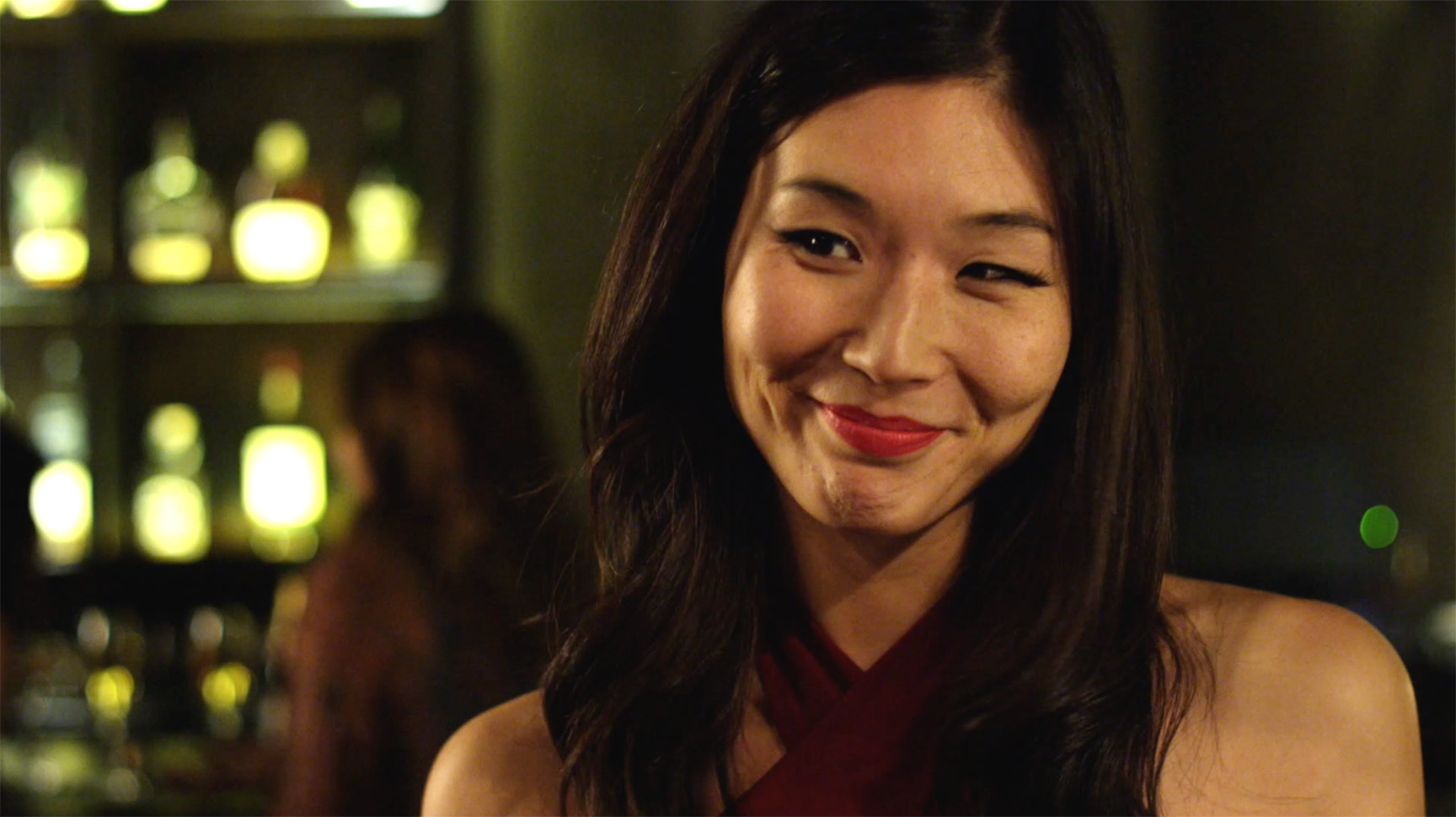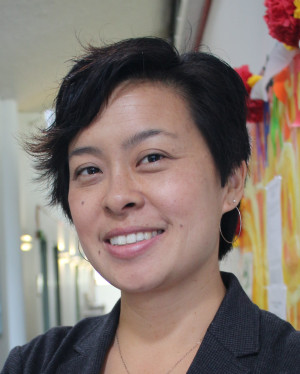By Dawn Lee Tu
Exclusive for 8Asians readers, check out Episode 6 of Kat Loves LA here before it gets released on 1/28!
Star, writer, and producer of Kat Loves LA, on not denying your Asian American identity, making that big leap into acting, and her love of rom-coms…
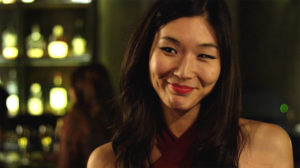 Paget Kagy (pronounced KAY-gee) is no stranger to talking about representations of Asian Americans in Hollywood. Kagy describes her parents as strong Asian American figures in her life who “always spoke about Asian American representation in the media and they were very well-educated in that way.” Her father, a successful lawyer, published Transpacific Magazine, one of the first Asian American magazines in the U.S., in the late 1980s which had a lasting impact on Kagy. He often spoke about “how there were never any Asian American role models in the media who weren’t stereotyped.” As a result, when Kagy took that leap into acting, she knew that she would create content and write roles with Asian American leads.
Paget Kagy (pronounced KAY-gee) is no stranger to talking about representations of Asian Americans in Hollywood. Kagy describes her parents as strong Asian American figures in her life who “always spoke about Asian American representation in the media and they were very well-educated in that way.” Her father, a successful lawyer, published Transpacific Magazine, one of the first Asian American magazines in the U.S., in the late 1980s which had a lasting impact on Kagy. He often spoke about “how there were never any Asian American role models in the media who weren’t stereotyped.” As a result, when Kagy took that leap into acting, she knew that she would create content and write roles with Asian American leads.
When Kagy began to write her web series Kat Loves LA (KLLA), currently available on YouTube, she was set on challenging Hollywood’s notions of being able to cast Asian Americans as leads in a mainstream and universally appealing and entertaining way.
I chatted with Kagy about the impact her parents had on her decision to go into acting, a very traumatic audition for The Lion King, and whether or not Kat finds love by the end of Season 1.
How did you grow up? What were some formative experiences?
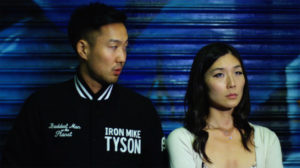 I was born in LA and I grew up here to two Korean parents and they moved here when they were really young so they’re extremely acculturated. My dad went to law school at UC Berkeley and my mom’s very well-educated. I’ve always strongly identified as Korean but when I was growing up, I was one of maybe three other Asian Americans in my class which was predominantly Caucasian. So I remember having a confusing relationship with being Asian because I didn’t see anyone who looked like me who was setting the standard of beauty or popularity in the school I went to or in the media.
I was born in LA and I grew up here to two Korean parents and they moved here when they were really young so they’re extremely acculturated. My dad went to law school at UC Berkeley and my mom’s very well-educated. I’ve always strongly identified as Korean but when I was growing up, I was one of maybe three other Asian Americans in my class which was predominantly Caucasian. So I remember having a confusing relationship with being Asian because I didn’t see anyone who looked like me who was setting the standard of beauty or popularity in the school I went to or in the media.
I do remember how kids can be cruel … kids would say, “go back to China” or they would pull back the corners of their eyes. I just thought that was the way the world unfairly saw Asians. I would always fight back but it was tough feeling like you’re an outsider just because of the way you look. I used to remember feeling like I wasn’t pretty or attractive. I didn’t set any kinds of standards of beauty or anything and it just made fitting in a little bit harder. I wasn’t a loner; I had friends but it was just kind of like a struggle that I internalized to a certain extent.
I guess it didn’t help that I was also kind of weird as a kid.
I was a big tomboy and I had this crazy obsession with The Lion King and people would make fun of me. I loved singing all the songs from The Lion King. Actually it’s kind of funny because when I was in elementary school, I heard that they were going to put on a musical of The Lion King. I knew all the songs and I really wanted to play Simba so I practiced and I practiced. When my name was called to the audition, I stepped on stage in front of all these parents and peers and I just remember completely freezing. I could barely see anything in front of me, I was shaking, and literally not one single note came out of my mouth, even though five minutes before I was singing all the songs by heart. I was so devastated and mortified about being cast as lion #36 or something like that. It was so embarrassing and I was so sad. When I got in the car and told my mom that I was cast as lion #36, she felt really bad and sad for me. Even though I had an interest in performing that (experience) sort of scared me away for a very long time. I always wanted to but had a lot of conflicting feelings because I felt like I never totally fit in.
I read that you went to UC Berkeley as well?
Yes. I love that campus! I wish I could go back. I loved it there so much!
I went there to study math and engineering, which I did for the first two years. I was also part of a jazz singing group. In junior year, I decided I was going to study abroad in Paris and while I was abroad I thought, I want to continue singing. So when I saw a flyer for a musical production at the American University of Paris, that’s kind of how I first got into acting. I auditioned and they cast me as Sheila in A Chorus Line. I really fell in love with the whole rehearsal process and that’s when I got my first taste of acting. When I came back to Berkeley, I didn’t want to do math. I didn’t want to do engineering. I switched my major to history and I also joined Theater Rice (an Asian American student theater group). That was such an amazing experience being part of that group! We did some short films and theater stuff and that’s really when I really started to explore the creative side of things and acting. I graduated and was doing digital marketing for a few years before really taking acting classes and pursuing acting.
What was that transition like for you, going from digital marketing to acting? Was it a gradual transition?
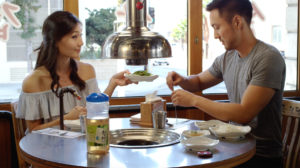 It was gradual. I wanted to accept myself but wanted to pursue something that my parents and friends might not be approving of so it was hard for me to fully accept that (desire). It took awhile for me to really to be able to say this is something I really want to do because I had this sense of shame around it. It started gradually with taking acting classes. I was doing it for fun and I was kind of denying that it was something I wanted to do for awhile before I bit the bullet and I just told people that I that’s what I wanted to do. It was a gradual process for my parents and my friends to really accept too.
It was gradual. I wanted to accept myself but wanted to pursue something that my parents and friends might not be approving of so it was hard for me to fully accept that (desire). It took awhile for me to really to be able to say this is something I really want to do because I had this sense of shame around it. It started gradually with taking acting classes. I was doing it for fun and I was kind of denying that it was something I wanted to do for awhile before I bit the bullet and I just told people that I that’s what I wanted to do. It was a gradual process for my parents and my friends to really accept too.
When I was acting or rehearsing or in class, I never felt as engaged in anything else as when I was engrossed in acting. That sounds really silly but that was the real gauge I had. Like what would I rather be spending my time doing? When I was in acting class or when I was performing, the answer was nothing else. When I was doing other things, I would daydream about acting. I would daydream about creating. That’s when I started to really feel compelled to own up to that choice. I just said to myself, look, when I’m on my deathbed and I look back, what am I going to regret the most? That sounds super dramatic but that’s just how I actually operate most of the time. Like, if I’m on my deathbed, I would have regretted not listening to that voice inside me that wanted to pursue something that I’m actually really passionate about. So it was a process but i think just asking myself that question a lot over a period of months was really what got me comfortable with it.
You share on your website that contributing “positive representations of Asian Americans in the media is a lifelong goal.” What inspires you to continue pursuing this goal?
I don’t know if it’s actually my blood to a certain extent but my father published the first Asian American magazine (Transpacific) back in the late 1980s. He was really upset growing up because he never, ever saw any Asian American role models in the media who weren’t stereotyped or like Long Duk Dong (in Sixteen Candles). It really pissed him off. He went to law school and he was a very successful lawyer but he transitioned into wanting to create positive representations of Asian Americans in the media specifically through this magazine that would portray Asian men as attractive and masculine. Maybe I’ve always felt this need to do a service to the Asian American community in representing Asian Americans, and specifically Asian American men who are highly underrepresented in the right kind of ways.
So when I was creating KLLA, I wanted the Asian male lead to be more likeable than my character. I just felt like that was more important for Asian Americans to see and I wanted to see a very charismatic, masculine, charming, Asian led because I don’t see that represented as much among Asian males in the media. So I can’t really quite articulate why else I feel that need but I guess I just feel like I want to contribute something and I want to add something back. It would be relatively easier in a sense if I wrote something for myself that had a white guy lead or something like that, but that’s not as meaningful to me.
KLLA opened this door to writing, so I am writing different scripts right now and developing them. For feature film scripts, I always naturally imagine an Asian male if it’s a romantic story. It sounds very intentional and I imagine, what if we cast an Asian male in that role or with this project? If we continue going on with it, I want to bring up other stronger Asian male actors and roles in and give people an opportunity too. Actors who I know, like one of the other Asian leads, his name is Kenny Leu, he was in The Long Run Home, he’s done a few other television things. He even says that when he goes out a lot of the times, it’s for a villain, like the Asian guy villain or the mobster. What he really wants to do is play an Asian male lead like in some comedy for instance and I really felt great that I could give him that representation (through KLLA) even if it’s on a smaller scale. He really enjoyed the script and wanted to be a part of it because there just isn’t enough of the opportunities out there. So whatever I go on writing or creating, it’s really about creating more opportunities for people to be cast in projects, whether that be in a producing role or writing role. That’s what I want to continue to do. I want to be more than just an actor. I want to be a content creator and a writer too.
Are you concerned at all about being pigeon-holed as someone doing “Asian American” projects or media?
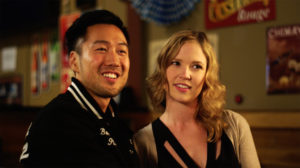 I’m actually not concerned with that. That concern is very minor to my general concern. My real goal is to try to make Asian American content in the mainstream and try to prove, with the content that we create, to Hollywood in little and big ways eventually that having Asian Americans as leads is actually something that people can consume and that doesn’t have to pigeonhole the content or the people in it. The Asian American umbrella can actually be universal and people can relate to it, so that’s more where my concern is. I mean I’m always going to be Asian American. I’m never going to pull the wool over someone’s eyes and have them look at me and be like, look at her, she’s an Asian girl who can be a white girl. It’s better to embrace (being Asian American) than to try and deny it on any level. It’s an integral part of who you are even if you’re not completely in the culture and for me, being Korean or American or whatever it is, you’re going to be that just by virtue of what you look like. It’s not a bad thing, and to embrace it is much better for your own self, self-esteem, and self-worth in the long run. I’m looking to have a career and not just book a couple of acting gigs. My long term pursuit is to actually contribute in a bigger way.
I’m actually not concerned with that. That concern is very minor to my general concern. My real goal is to try to make Asian American content in the mainstream and try to prove, with the content that we create, to Hollywood in little and big ways eventually that having Asian Americans as leads is actually something that people can consume and that doesn’t have to pigeonhole the content or the people in it. The Asian American umbrella can actually be universal and people can relate to it, so that’s more where my concern is. I mean I’m always going to be Asian American. I’m never going to pull the wool over someone’s eyes and have them look at me and be like, look at her, she’s an Asian girl who can be a white girl. It’s better to embrace (being Asian American) than to try and deny it on any level. It’s an integral part of who you are even if you’re not completely in the culture and for me, being Korean or American or whatever it is, you’re going to be that just by virtue of what you look like. It’s not a bad thing, and to embrace it is much better for your own self, self-esteem, and self-worth in the long run. I’m looking to have a career and not just book a couple of acting gigs. My long term pursuit is to actually contribute in a bigger way.
What was the inspiration for Kat Loves LA? How did the idea to write a web series come about?
I knew that I wanted to create a story with Asian American leads but I know there is web content out there already like Wong Fu Productions and things like that. But I wanted to create a story with Asian American leads that I myself as a viewer would want to watch, and I love romantic comedies, so (doing) that was really natural. I also wanted to challenge Hollywood’s notions of being able to cast Asian Americans as leads and have (the story) be mainstream and universally appealing and entertaining. I also wanted to explore my abilities and talents outside of acting, actually contribute content, and not just talk about it. So how do we get that start? To me, you self-produce and you put it online so everyone can have access to it.
The actual story behind (KLLA) is not really that glamorous or anything. It came from my own personal experience of when I got out of a long term relationship and I was newly single in LA. I was personally going through a tough time. I felt really isolated and had this pressure that I needed to date and find someone to date because I’m heading into my 30s. So I just thought well, you write what you know. I think it’s a sentiment that a lot of people can relate to even though they don’t talk about it. That’s how the Kat character developed. Then I knew I wanted to make the leading guy Asian so I thought, wouldn’t it be interesting if their conflict and their dynamic actually involved being Asian. So I was trying to think about what that would look like in a new kind of way. We’ve seen Asian girls who only date white guys but what if we see an Asian guy who only dates white girls and he doesn’t date Asian girls? It’s kind of the Pride and Prejudice dynamic where at first they have this misunderstanding and prejudice against each other, but in the end they see a lot of commonality. They are able to connect and their culture is part of that.
What has your experience been working on this homegrown, grassroots project? What have you learned about creating and getting the word out about KLLA?
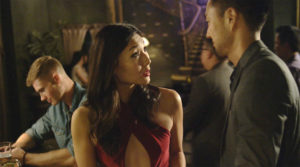 It’s been extremely rewarding and also obviously very challenging because I’ve never done this before. I will say that when you really believe in something and you want to see something come to fruition, you will call upon all your resources. Even if you have no idea what you’re doing, you’ll just make sure that it gets done. For instance we really didn’t have that much of a budget, even though we raised over 200% of our goal on Indiegogo. I didn’t really know how much it would cost to do all this on this level so I invested my own money to an extent and I had to just because I didn’t want to ask people for more funds.
It’s been extremely rewarding and also obviously very challenging because I’ve never done this before. I will say that when you really believe in something and you want to see something come to fruition, you will call upon all your resources. Even if you have no idea what you’re doing, you’ll just make sure that it gets done. For instance we really didn’t have that much of a budget, even though we raised over 200% of our goal on Indiegogo. I didn’t really know how much it would cost to do all this on this level so I invested my own money to an extent and I had to just because I didn’t want to ask people for more funds.
I also taught myself how to edit because editing is a very expensive part of the process and I really had to teach myself what it means to be a producer. I didn’t call myself a producer until other people started calling me a producer when they said wow, I can’t believe you got all these people on board and you got all these locations and all of that. To me it was just a matter of one step at a time. Like, okay, what do we need to do to shoot the first four eps? Ok, we need to shoot these locations and these people on our crew and we need to schedule everyone so that it’ll work in the most efficient way possible so I just tried to figure it out like a math problem and really piecemeal it together. I had no system. I just knew no one else is going to do this and I needed to, so what are the steps? Who do I need to contact? It was a lot of work, a lot of talking to a lot people whom I wouldn’t have thought I would have ever talked to like restaurant owners, owners of franchises, random bars, cafes, like going to actually speak to them in person, a lot meetings with people in person and what we’re doing is worthwhile and it was really that. It was a lot of kindness from a lot of different people who wanted to help out. But it was very piecemeal, and it was overwhelming but you kinda have to get it done at the end of the day.
What’s next for KLLA? I know you’re working on a second season. Are you working on any other exciting projects?
So with the second season, I’m in the process of writing it and mapping it out but it’s going to be a season of celebration and love. At the end of the first season, she really has to struggle with the idea of following her heart versus her head. There’s a lot of celebrations and you know she turns 30. Oh, there’s a lot of things I can’t say because it’s going to reveal things. Just a lot of celebration and love! Love in terms of really coming from her heart, whether that’s career-wise or romance-wise and having her really understand what that means!
We’re continuing to release one episode a week Sunday mornings. We have 9 episodes and we’re in post production for them so we’re focusing on that and releasing those and as far as social media.
Find the latest episodes of Kat Loves LA on the website or YouTube. For updates and behind the scenes and other special content, follow on Facebook, Instagram, or Twitter. For more on Paget Kagy, visit her website here.
This interview was edited for clarity and brevity.
About the author: Dawn Lee Tu does a lot of things including teaching and writing and is sometimes known for being quite knowledgeable about short hair, ice cream, and Asian American things. You can find her on Twitter at @dawnleetu
